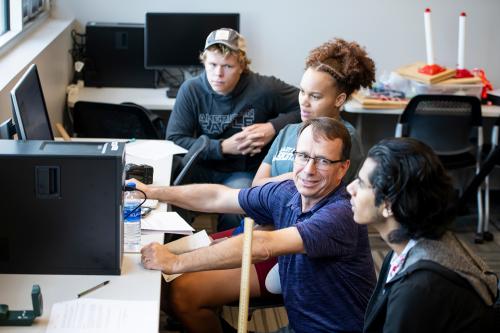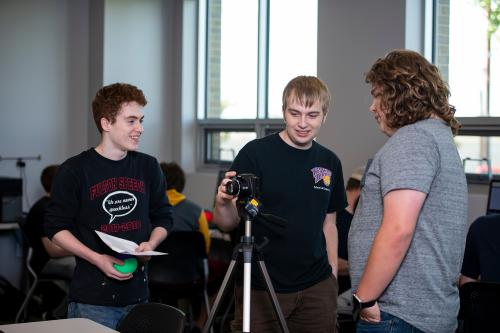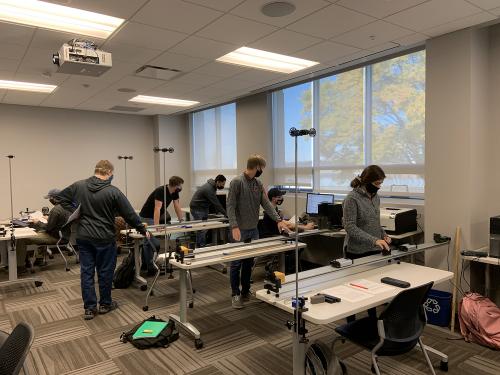University News
Program to Allow Peers to Help Students in the Classroom Provides Benefits During the Pandemic
November 20, 2020
MACOMB/MOLINE, IL – A peer-based program that helps Western Illinois University students in the classroom has been altered during the COVID-19 pandemic for continued use by several professors.
The Learning Assistant (LA) program originated at the University of Colorado more than a decade ago, but was brought to Western's Quad Cities campus by James Rabchuk, assistant dean of the WIU College of Arts and Sciences, about four years ago and use began on the Macomb campus about one year ago. The program brings peer students into the classroom for lectures, to help steer discussions and problem-solving sessions.
"The program helps with retention and contributes to better preparation of students in our foundational courses," said WIU Department of Physics Chair Kishor Kapale. "We started implementing the program on the Macomb campus last year. Our preliminary data shows a great improvement in student learning of the concepts along with the enhancement of their problem-solving skills."
WIU physics professors P.K. Babu and Esteban Araya implemented the program on the Macomb campus last year.
Rabchuk said in addition to improving instruction in college classrooms, the LA program also strives to recruit more qualified students as teacher education majors in the sciences.
"Here at WIU, the program was introduced to support learning in the core courses for the engineering program, with the goal of improving program retention," said Rabchuk. "Last year, retention, from first to second year in engineering, improved to over 90%, from around 60% when we started in 2017. Dr. Susan Brooks and I have collaborated from the beginning in this endeavor, and Dr. Blair McDonald has been a strong supporter in the engineering program. He teaches engineering statics, which is the first engineering course taken by the cohort."
Rabchuk said the LAs are recruited from previous years' classes, from students who were successful and displayed an ability and aptitude for teaching.
"They also are required to take a course in pedagogy their first semester as LAs, in order to train them in the methods and goals," he added.
As courses have transitioned online during COVID-19, Rabchuk said the LAs have played a major role in keeping students engaged and focused on conceptual learning.
"This semester, Dr. Brooks and I both made significant changes how we teach our classes," Rabchuk said. "Dr. Brooks has taught calculus as a live stream course, with some students in the classroom, and others joining via Zoom. One of the two LAs monitors the Zoom session to answer questions via chat, or to raise a question for Dr. Brooks' attention. The other LA works with her in the class as she has students work through the notes or doing practice problems."
Rabchuk has taught his physics class in a hybrid format, with in-person labs twice a week for the first three weeks, and chapter quizzes and exams with synchronous and recorded lectures over Zoom.
"The learning assistants have worked with the lab groups (just two per station to maintain social distancing), leading breakout sessions to work through problems with smaller groups during lecture, answering questions via email, and leading exam review sessions on Zoom," he said. "For the most recent exam, 18 out of the 21 students in the class participated in the review. The learning assistants also did a course evaluation as part of their training. All of the students responded positively to the presence of LAs in the class. One commented, 'I cannot think of a way to make the learning easier, but I think that break out rooms via Zoom are very beneficial for students.' They also commented that the review sessions were very helpful."
From Rabchuk's perspective, the mix of face-to-face time, focused on hands-on learning for students, and lectures over Zoom, with a chance to work in smaller groups has been very effective in helping students begin to master the concepts required to be successful in Physics and in their future engineering courses. With the added classroom help for students, it allows them to become part of a community in WIU's engineering program, and allows the LAs to learn the material from a teaching perspective.
"They learn how to teach and how to learn, which impacts them positively as well," he said. "
And, they experience the rewards of teaching as they see the students they help improve and successfully progress towards completion of their degree. I think that Dr. Brooks would agree that the LAs have actually been even more important to the success of our classes this year as we navigate the changes brought on by the pandemic."
WIU students serving as LAs in the Quad Cities this semester include Camden Sellers, a sophomore electrical engineering major, of Coal Valley, IL; sophomore mechanical engineering-robotics major Nathanael Weber; senior mechanical engineering-robotics major Caleb Engebrecht, of Milan, IL, and senior general studies, pre MBA major, Lyndsey Powell, of Aledo, IL. The LA working on the Macomb campus this semester is senior physics major Natalie Kovacevic, of Plainfield, IL.
For more information on WIU's Department of Physics, visit wiu.edu/physics.
Posted By: Jodi Pospeschil (JK-Pospeschil@wiu.edu)
Office of University Communications & Marketing




Connect with us: